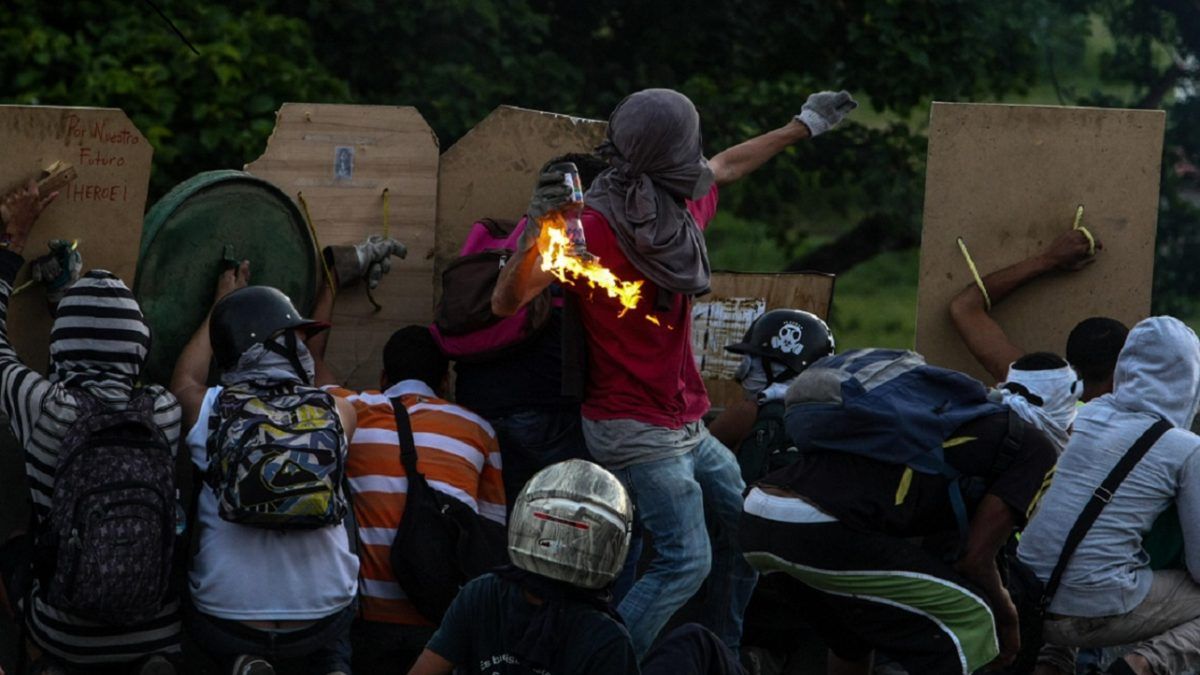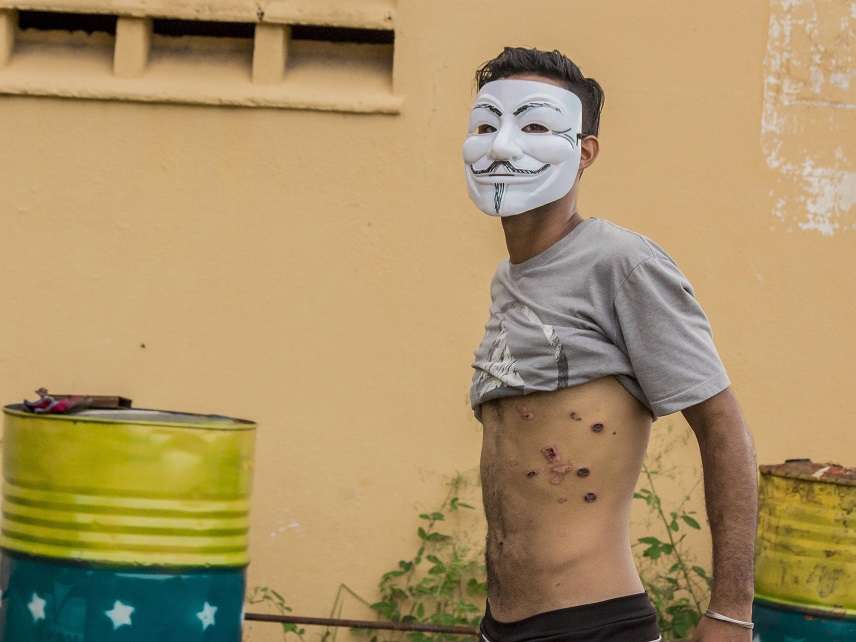Venezuela: At the Edge of a Deeper Chasm
Nicolas Maduro's brand of socialism has brought poverty, hunger, and death.

Guayana City, Venezuela—Once the Latin American country with the highest growth rate, now the poorest in the hemisphere, Venezuela is in free fall. Hundreds are dying from diseases, some of them all but eradicated, because of a shortage of medicines and vaccines. According to the consultancy firm Econometrica, 2.1 million Venezuelans are now eating from the garbage.
Its citizens are at war with the military. The situation has so deteriorated U.S. President Donald Trump surprised Latin American leaders this past Friday when he said, "We have many options for Venezuela, including a possible military option if necessary." Trump later added, "Venezuela is not very far away and the people are suffering and they're dying."
The real enemy responsible for this lethal landscape is not foreign. This destruction has come from within. For almost two decades, Venezuela's socialist government has managed to undermine every institution that kept the country afloat.
When Hugo Chavez ascended to the presidency in 1998, he had an agenda: Bring socialism to Venezuela, then export it to the rest of Latin America. His successor, Nicolas Maduro, has continued the country's hurtle down a slope paved by the total destruction of the means of production. Indeed, he has managed to sharpen the slope.
On May 29, the Supreme Court of Justice declared the National Assembly in contempt and usurped its functions. That unleashed a series of protests, which in turn generated a wave of repression that has so far killed more than 130 people and imprisoned nearly 1,400. Maduro declared victory at the end of July with an illegal election. The company that provided the voting system alleges that the results were tampered with.
Sixteen people died violently on polling day.
The violence, the repression, the assault on fundamental human rights, and the rupture of the constitutional order have prompted opposition leaders to defend two critical articles in the Constitution:
Article 333: This Constitution shall not cease to be in effect if it ceases to be observed due to acts of force or because or repeal in any manner other than as provided for herein. In such eventuality, every citizen, whether or not vested with official authority, has a duty to assist in bringing it back into actual effect.
Article 350: The people of Venezuela, true to their republican tradition and their struggle for independence, peace and freedom, shall disown any regime, legislation or authority that violates democratic values, principles and guarantees or encroaches upon human rights.
T-shirt Soldiers
The resistance is mainly composed of teens and young adults born under socialism, fighting to defend the country from what they believe will be the deeper abyss of communism. T-shirt soldiers, they call them.
"Bubble" is a 23-year-old journalism student who set aside his studies for a "greater good." Raised in a leftist household, he grew tired of watching poverty take over everything, including his own home.

Bubble and some 20 other resistance members call the place where they are entrenched "Mangokistan." Los Mangos—a residential area in the port city of Guayana, in Bolívar State, in the eastern part of the country—has become a place of perpetual war.
The Bolivarian Intelligence Service has the area under surveillance. It seizes people on any pretense. Walking down the street can get you arrested.
The area was recently attacked for more than 20 hours, just because the resistance blocked the streets. What they mostly resisted was the constant tear gas and rubber bullets fired at them by the National Guard.
"I left my home because my parents support the government, when sometimes we didn't have enough to buy groceries," Bubble tells me. "Now I live in the different places of those who back us. The truth is that we are doing this because we are tired of seeing people starving and dying of the lack of medicine. Living under these conditions is feeling helpless, like we have no future. We do not follow opposition leaders, we are not politicians. We are willing to do this even if it costs us our lives. Until Venezuela is free."
These street fighters make shields with just about anything. Their weapons are fireworks and Molotov cocktails. They constantly cover their faces and change their names for fear of being identified and detained, like a lot of their friends.
"Living under these conditions is feeling helpless, like we have no future. We do not follow opposition leaders, we are not politicians. We are willing to do this even if it costs us our lives. Until Venezuela is free."
According to the non-governmental organization Foro Penal—Spanish for Criminal Forum—278 have been detained in Bolívar State alone. Only 12 of those detainees have been formally accused by prosecutors. The others have been accused by judges who have usurped the prosecutor function; 21 of them have been released under injunction, while 40 are under injunction but still in custody. The others are under house arrest.
"We shelter them and provide them with food because they are mainly teenagers that just want a better future," "Beatitude" tells me. "They are fighting for everyone's freedom. Living like this is terrible. We don't sleep because we are constantly under surveillance or under attack."
A neighbor, who also wishes not to be identified, says they live with the horror of being besieged. "There was one time a National Guard gun pointed at me with my six month old baby in my arms," she says. "They broke into the apartments without a warrant."
Despair
"Fernanda" is the mother of "Rojo," a political prisoner who has been detained for nearly 80 days, longer than all the others. He should have been sent home under injunction 50 days ago. She uses a false name because her son is still in jail.
On April 19, plainclothed officers removed Rojo from Mangokistan and took him to a park, where they tortured him until he lost consciousness. "He told me these men punched him, dragged him to the asphalt, burned his chest with a lighter and suffocated him," Fernanda says. "They wanted the names and locations of other members of the resistance."
Three hours passed without Fernanda knowing Rojo's whereabouts. She didn't know he had joined the resistance, let alone he had been arrested. "The neighbors told me they found out by Twitter and Instagram," she said.
Fernanda later learned Rojo had been taken to a maximum security prison, Centro Penitenciario de Oriente in El Dorado, three hours from his home. They did not allow him to shower for seven days, and he got scabies.
Vehement protest of his arrest brought Rojo back to his previous detention site, where he has fought off hardened inmates, Fernanda tells me. At one point, she says, he spent days in the sun and rain, tied to a pole.
Currently he is in a cell with no windows, where he and other prisoners sleep on the floor. They aren't allowed outside.
"He is literally rotting in jail," says Ezequiel Monsalve, coordinator of Foro Penal. "In almost 80 days he has been denied every humanitarian measure. He hasn't been seen by a doctor."

After all that has occurred, Rojo's sister, a 21-year-old student, has now joined the resistance. She calls herself "Venezuela," her mother says.
"I feel like a prisoner myself," Fernanda says. "Both of my children are in life-threatening danger. They used to never get out of the house. Rojo only used to sometimes go to play soccer in the afternoon. He is a sweet innocent boy, always respectful and kind. Now he is desperate to get out and I know that the minute we finally have that chance I have to take him to the doctor and a psychologist. He is not well. Everything that has happened has had an impact on him. Despair is what I am living every day."
Neglect
The Venezuelan people struggle every day with inflation. To buy groceries is almost a miracle. The minimum wage has been increased three times this year by government fiat; including a food stamp allotment, it is now roughly 250 thousand bolivars, or $25 a month. The basic food basket for a family is almost 1.5 million bolivars, more than $150. Famine is taking over.
Basic drugs have become scarce. Malaria has struck hard, killing 66 people this year. Diphtheria, once all-but eradicated, killed 25 people, most of them children, in 2016. Cancer, AIDS, diabetes, and hypertensive patients are dying without medication. Doctors' hands are tied.
This summer's vote is widely considered a sham. Electoral authorities said more than eight million people, or 41.5 percent of the electorate, voted. Yet a Reuters reporter claims to have seen an internal memo from the Electoral Council saying fewer than four million votes had been cast just two hours before polls closed. Opposition leaders and even the attorney general agree that participation was closer to 12 percent.
This latest phase in the drift toward dictatorship began with the dismissal of Attorney General Luisa Ortega Díaz. The assembly plans to take further legal actions against her and opposition leaders, claiming they are "terrorists."
Venezuela isn't an island, but each day the country becomes more isolated. In less than a week four different foreign airlines have stopped operations here.
Over the past 17 years, nearly two million Venezuelans have left their country. As of 2016, nearly 23,000 have applied for political asylum with the U.S., the largest number from any one country.
The exodus is increasing. As many as 25,000 people daily cross the Simon Bolivar International Bridge into Colombia. Some return; many do not. Colombia is treating them as refugees. The Colombian government has opened a shelter in Cúcuta, at the Venezuelan border.
"We are ready to offer help to any Venezuelan citizens that need it," Colombia's foreign minister, María Ángela Holguín, recently told a local radio reporter in Cúcuta.
Mercosur, South American sub-regional economic bloc, has expelled Venezuela over its failure to comply with democratic principles. The United States government has frozen Maduro's American assets, and U.S. companies and individuals are now banned from doing business with him.
Washington is considering further actions against Venezuela's oil industry, which could prove devastating in light of the ongoing economic crisis. Vice President Mike Pence said Monday in Colombia, "we're looking at the full range of additional economic sanctions."
International sanctions will only make things worse. The food and medicine shortages will deepen. More people will die.
In the streets, people continue to protest. Some military groups have joined the resistance, which struggles to maintain the few free spaces left. Last week, former military captain Juan Caguaripano led an assault that briefly captured the Paramacay army base in Valencia, about two hours west of the nation's capital.
The rebels were driven out. The government says there were rebel deaths; the rebels deny it. Caguaripano's forces made off with weapons, and the assault created a social media stir. Caguaripano says he is moving on to training civilians to defeat Nicolas Maduro's socialist dictatorship.
It has come to this.


Show Comments (45)